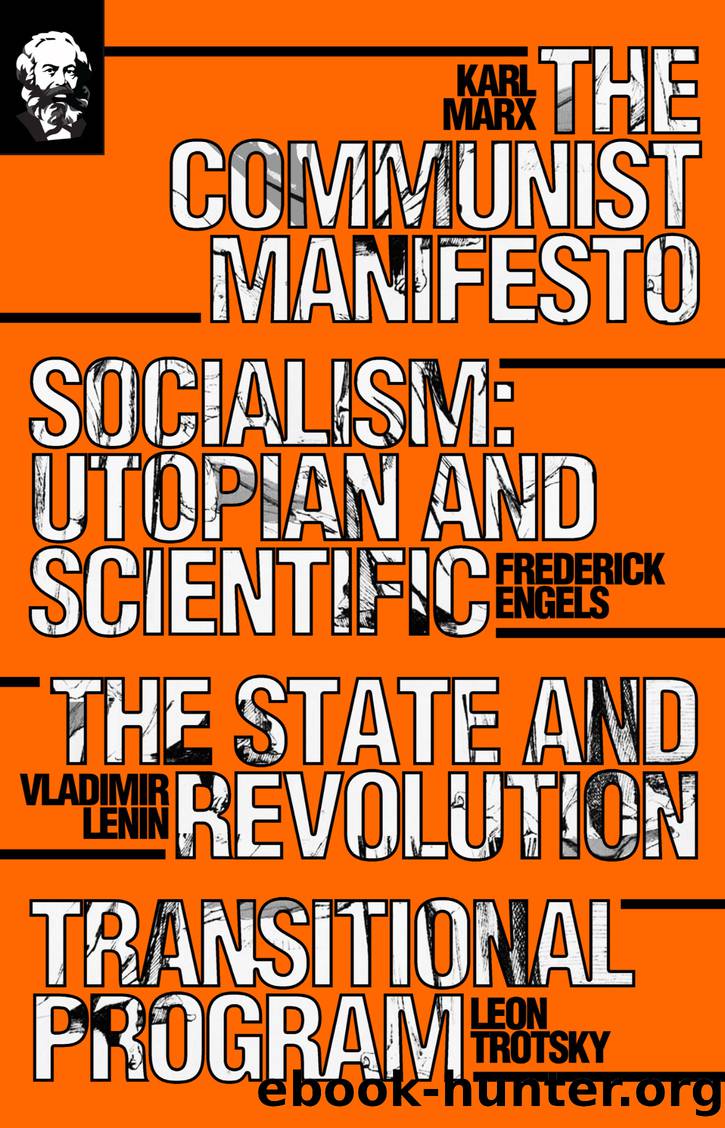The Classics of Marxism by Karl Marx & Frederick Engels & V.I. Lenin & Leon Trotsky

Author:Karl Marx & Frederick Engels & V.I. Lenin & Leon Trotsky
Language: eng
Format: epub
Tags: History : Revolutionary
Publisher: Wellred
Published: 2018-11-13T00:00:00+00:00
3. Abolition of Parliamentarism
âThe Commune,â Marx wrote, âwas to be a working, not a parliamentary, body, executive and legislative at the same timeâ¦.
Instead of deciding once in three or six years which member of the ruling class was to represent and repress [ver- and zertreten] the people in parliament, universal suffrage was to serve the people constituted in communes, as individual suffrage serves every other employer in the search for workers, foremen and accountants for his business.
Owing to the prevalence of social-chauvinism and opportunism, this remarkable criticism of parliamentarism, made in 1871, also belongs now to the âforgotten wordsâ of Marxism. The professional Cabinet Ministers and parliamentarians, the traitors to the proletariat and the âpracticalâ socialists of our day, have left all criticism of parliamentarism to the anarchists, and, on this wonderfully reasonable ground, they denounce all criticism of parliamentarism as âanarchismâ!! It is not surprising that the proletariat of the âadvancedâ parliamentary countries, disgusted with such âsocialistsâ as the Scheidemanns, Davids, Legiens, Sembats, Renaudels, Hendersons, Vanderveldes, Staunings, Brantings, Bissolatis, and Co., has been with increasing frequency giving its sympathies to anarcho-syndicalism, in spite of the fact that the latter is merely the twin brother of opportunism.
For Marx, however, revolutionary dialectics was never the empty fashionable phrase, the toy rattle, which Plekhanov, Kautsky and others have made of it. Marx knew how to break with anarchism ruthlessly for its inability to make use even of the âpigstyâ of bourgeois parliamentarism, especially when the situation was obviously not revolutionary; but at the same time he knew how to subject parliamentarism to genuinely revolutionary proletarian criticism.
To decide once every few years which members of the ruling class is to repress and crush the people through parliamentâthis is the real essence of bourgeois parliamentarism, not only in parliamentary- constitutional monarchies, but also in the most democratic republics.
But if we deal with the question of the state, and if we consider parliamentarism as one of the institutions of the state, from the point of view of the tasks of the proletariat in this field, what is the way out of parliamentarism? How can it be dispensed with?
Once again, we must say: the lessons of Marx, based on the study of the Commune, have been so completely forgotten that the present-day âSocial Democratâ (i.e., present-day traitor to socialism) really cannot understand any criticism of parliamentarism other than anarchist or reactionary criticism.
The way out of parliamentarism is not, of course, the abolition of representative institutions and the elective principle, but the conversion of the representative institutions from talking shops into âworkingâ bodies. âThe Commune was to be a working, not a parliamentary, body, executive and legislative at the same time.â
âA working, not a parliamentary bodyââthis is a blow straight from the shoulder at the present-day parliamentarians and parliamentary âlap dogsâ of Social Democracy! Take any parliamentary country, from America to Switzerland, from France to Britain, Norway and so forthâin these countries the real business of âstateâ is performed behind the scenes and is carried on by the departments, chancelleries, and General Staffs.
Download
This site does not store any files on its server. We only index and link to content provided by other sites. Please contact the content providers to delete copyright contents if any and email us, we'll remove relevant links or contents immediately.
| Anarchism | Communism & Socialism |
| Conservatism & Liberalism | Democracy |
| Fascism | Libertarianism |
| Nationalism | Radicalism |
| Utopian |
The Secret History by Donna Tartt(19028)
The Social Justice Warrior Handbook by Lisa De Pasquale(12182)
Thirteen Reasons Why by Jay Asher(8883)
This Is How You Lose Her by Junot Diaz(6872)
Weapons of Math Destruction by Cathy O'Neil(6261)
Zero to One by Peter Thiel(5782)
Beartown by Fredrik Backman(5734)
The Myth of the Strong Leader by Archie Brown(5491)
The Fire Next Time by James Baldwin(5423)
How Democracies Die by Steven Levitsky & Daniel Ziblatt(5211)
Promise Me, Dad by Joe Biden(5139)
Stone's Rules by Roger Stone(5078)
A Higher Loyalty: Truth, Lies, and Leadership by James Comey(4946)
100 Deadly Skills by Clint Emerson(4911)
Rise and Kill First by Ronen Bergman(4775)
Secrecy World by Jake Bernstein(4738)
The David Icke Guide to the Global Conspiracy (and how to end it) by David Icke(4696)
The Farm by Tom Rob Smith(4500)
The Doomsday Machine by Daniel Ellsberg(4481)
